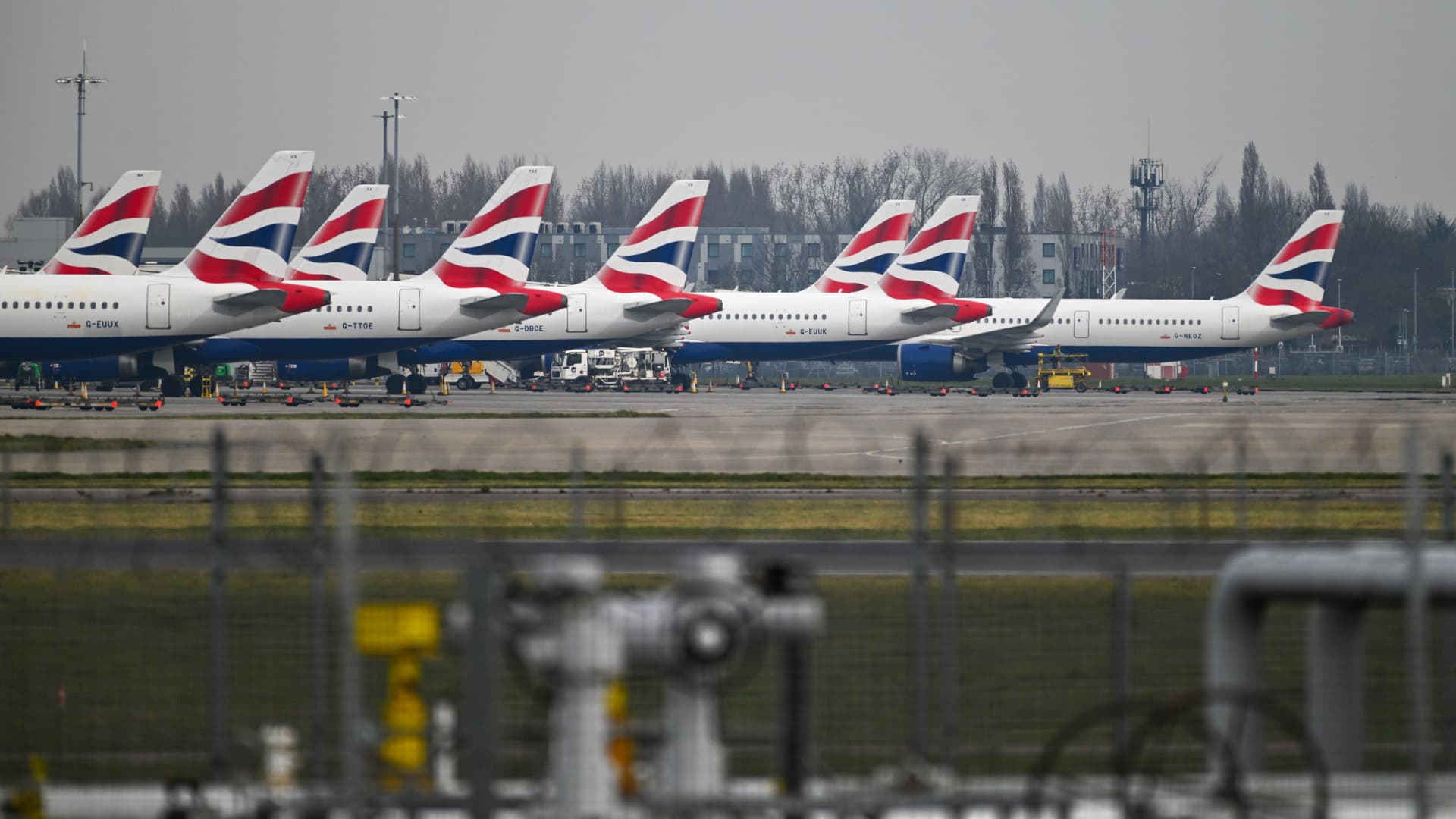Global Trends and Politics
Heathrow Airport Closes After Fire Causes Power Outage

London’s Heathrow Airport closed on Friday after a fire at a nearby electrical substation caused a power outage, disrupting travel for tens of thousands of passengers planning to fly in or out of Europe’s busiest airport.
The first flight since the closure departed late Friday local time, and Heathrow posted on X that it hopes to run a "full operation" on Saturday.
More than 800 flights were canceled in and out of the airport on Friday, according to flight-tracking site FlightAware, as of the most recent update, upending travel at the major hub and connecting airport.
Airlines warned travelers that disruptions could continue into the weekend, and Heathrow posted that travelers shouldn’t go to the airport unless advised to do so by their airline.
Canceled and diverted flights
More than 120 flights were already in the air when the closure was announced and were diverted or returned to their originating airports, according to Flightradar24. Nearly three-quarters of the flights scheduled to depart from Heathrow, or 500 flights, and half of the arrivals destined for the airport, 300 flights, were also scrubbed.
‘Catastrophic’ fire
The fire, which was described as "catastrophic" by Ed Miliband, U.K. energy minister, and "like a fire they’ve never, kind of, quite seen anything like the scale of what happened before" by National Grid, left thousands of travelers stranded.
It makes Heathrow look quite vulnerable
Heathrow Airport has an estimated 1,300 takeoffs and landings at the airport per day, according to its website. It handled a record 83.9 million passengers last year – a nearly 6% increase from 2023.
Very wide implications
Anita Mendiratta, a travel and tourism advisor and founder of consultancy AM&A, described the implications of the fire and closure of the airport as "very wide."
Conclusion
The fire at the electrical substation has caused significant disruptions to travel at Heathrow Airport, with hundreds of flights canceled and thousands of passengers affected. The airport is working to resume operations as soon as possible, but travelers are advised not to go to the airport unless advised to do so by their airline.
Frequently Asked Questions
Q: What caused the power outage at Heathrow Airport?
A: A fire at a nearby electrical substation caused the power outage.
Q: How many flights were canceled due to the power outage?
A: Over 800 flights were canceled in and out of the airport on Friday.
Q: When is Heathrow Airport expected to reopen?
A: The airport hopes to run a "full operation" on Saturday.
Q: What is the current status of flights?
A: Airlines are warning travelers that disruptions could continue into the weekend.
Q: What is being done to resolve the issue?
A: The airport and airlines are working to resolve the issue as quickly as possible, with the airport posting updates on its website and social media platforms.
Q: Who is investigating the fire?
A: The Metropolitan Police’s Counter Terrorism Command is leading the investigation into the fire.
Global Trends and Politics
Avoiding the Pitfalls: Strategies for Effective Communication in a Political Workplace

As political impacts on workplaces continue to rise, effective communication is crucial for success. In today’s fast-paced, globally connected world, the political landscape can significantly influence the workplace, making it essential to navigate these challenges with ease. With the ever-changing political climate, employees and employers must be aware of the potential pitfalls that can arise and develop strategies to overcome them.
Understanding the Political Landscape
The political landscape can have a significant impact on the workplace, with issues like election results, policy changes, and social movements affecting employee morale, productivity, and overall job satisfaction. For instance, the 2020 US presidential election saw a significant increase in workplace discussions and debates, with some employees feeling uncomfortable or even harassed by their coworkers’ political views. Employers must be aware of these potential issues and develop strategies to address them.
Recognizing the Risks of Polarization
Polarization is a significant risk in the workplace, as employees with differing political views can create a toxic work environment. A study by the Society for Human Resource Management found that 44% of employees reported feeling uncomfortable discussing politics at work, while 25% reported feeling harassed or bullied due to their political views. Employers must take steps to prevent polarization and create a welcoming environment for all employees.
Addressing Microaggressions and Bias
Microaggressions and bias can also be significant issues in the workplace, particularly in environments where political views are openly discussed. For example, a study by the Harvard Business Review found that employees who experienced microaggressions were more likely to feel disengaged and less productive. Employers must take steps to address microaggressions and bias, such as providing training and creating a safe and inclusive work environment.
Developing Effective Communication Strategies
Effective communication is crucial for success in a political workplace. Employers and employees must develop strategies to navigate difficult conversations and create a welcoming environment for all. Some effective communication strategies include active listening, empathy, and respect for differing opinions. For instance, a study by the Journal of Applied Psychology found that employees who felt heard and understood by their employers were more likely to be engaged and productive.
Creating a Safe and Inclusive Work Environment
Creating a safe and inclusive work environment is essential for effective communication in a political workplace. Employers can achieve this by establishing clear policies and procedures for addressing political discussions and debates, as well as providing training on diversity, equity, and inclusion. For example, Google’s diversity and inclusion program has been recognized as one of the best in the industry, with a focus on creating a welcoming environment for employees from all backgrounds.
Encouraging Open and Respectful Dialogue
Encouraging open and respectful dialogue is also essential for effective communication in a political workplace. Employers can achieve this by creating a culture of respect and empathy, where employees feel comfortable sharing their opinions and views. For instance, a study by the Journal of Business Ethics found that employees who felt comfortable sharing their opinions were more likely to be engaged and committed to their employer.
Navigating Difficult Conversations
Navigating difficult conversations is a crucial aspect of effective communication in a political workplace. Employers and employees must be able to navigate conversations about sensitive topics, such as politics and social issues, with ease and respect. Some strategies for navigating difficult conversations include staying calm and composed, listening actively, and focusing on the issue rather than the person.
Managing Conflict and Disagreements
Managing conflict and disagreements is also essential for effective communication in a political workplace. Employers can achieve this by establishing clear policies and procedures for addressing conflicts, as well as providing training on conflict resolution and management. For example, a study by the Journal of Conflict Resolution found that employees who received training on conflict resolution were more likely to manage conflicts effectively and maintain positive relationships with their coworkers.
Building Trust and Credibility
Building trust and credibility is crucial for effective communication in a political workplace. Employers and employees must be able to trust each other to navigate difficult conversations and create a welcoming environment for all. Some strategies for building trust and credibility include being transparent and honest, following through on commitments, and demonstrating a commitment to diversity, equity, and inclusion.
Conclusion
In conclusion, effective communication is crucial for success in a political workplace. Employers and employees must develop strategies to navigate difficult conversations, create a safe and inclusive work environment, and build trust and credibility. By understanding the political landscape, recognizing the risks of polarization, and addressing microaggressions and bias, employers can create a welcoming environment for all employees. By following the strategies outlined in this article, employers can navigate the challenges of a political workplace and create a positive and productive work environment.
Frequently Asked Questions
Q: How can I create a safe and inclusive work environment in a political workplace?
A: Creating a safe and inclusive work environment in a political workplace involves establishing clear policies and procedures for addressing political discussions and debates, as well as providing training on diversity, equity, and inclusion.
Q: How can I navigate difficult conversations about politics in the workplace?
A: Navigating difficult conversations about politics in the workplace involves staying calm and composed, listening actively, and focusing on the issue rather than the person.
Q: What are some strategies for building trust and credibility in a political workplace?
A: Some strategies for building trust and credibility in a political workplace include being transparent and honest, following through on commitments, and demonstrating a commitment to diversity, equity, and inclusion.
Q: How can I address microaggressions and bias in the workplace?
A: Addressing microaggressions and bias in the workplace involves providing training on diversity, equity, and inclusion, as well as creating a safe and inclusive work environment where employees feel comfortable sharing their opinions and views.
Q: What are some effective communication strategies for a political workplace?
A: Some effective communication strategies for a political workplace include active listening, empathy, and respect for differing opinions, as well as creating a culture of respect and empathy where employees feel comfortable sharing their opinions and views.
Global Trends and Politics
Newark Air Traffic Controllers Lose Contact with Planes

Introduction to Air Traffic Control Outages
A man stands outside Terminal C with the airport control tower in the background at Newark Liberty International Airport, on May 6, 2025 in Newark, New Jersey. Andres Kudacki | Getty Images
Recent Outage at Newark Liberty International Airport
Air traffic controllers who guide planes in and out of Newark Liberty International Airport lost radar and communication with aircraft before dawn on Friday in another 90-second outage, the Federal Aviation Administration said, hours after the Trump administration unveiled a plan to overhaul the aging technology that keeps U.S. airspace safe. The outage occurred at about 3:55 a.m. ET, the FAA said. There are far fewer aircraft flying overnight, so disruptions were minimal compared with a similar outage on the afternoon of April 28, which snarled air travel for days.
Impact of the Outage
Several controllers took leave because of the stress of that April incident, the FAA said. That exacerbated low staffing levels at the Philadelphia facility tasked with guiding planes in and out of Newark Liberty International Airport in New Jersey, forcing the FAA to slow the airport’s traffic. Like in the April incident, Friday’s outage left controllers unable to communicate with aircraft and their radar screens dark.
Need for Improvements to Air Traffic Control
Airlines and labor groups said in February that the U.S. urgently needs billions of dollars in emergency funding from Congress for improvements to air traffic control, which has faced both staffing shortfalls and outdated equipment.
Conclusion
The recent outages at Newark Liberty International Airport highlight the need for improvements to air traffic control technology and staffing levels. The Federal Aviation Administration and airlines are working together to address these issues and prevent future disruptions to air travel.
FAQs
Q: What happened at Newark Liberty International Airport on Friday?
A: Air traffic controllers lost radar and communication with aircraft for 90 seconds due to a technical outage.
Q: What was the impact of the outage?
A: The outage caused minimal disruptions since it occurred overnight when there are fewer aircraft flying.
Q: What is being done to address the issues with air traffic control?
A: The Trump administration has unveiled a plan to overhaul the aging technology, and airlines and labor groups are seeking emergency funding from Congress for improvements.
Q: How often do outages like this occur?
A: This is the second outage in recent months, with a similar incident occurring on April 28.
Q: What are the main challenges facing air traffic control?
A: Air traffic control is facing staffing shortfalls and outdated equipment, which need to be addressed to prevent future outages and disruptions.
Global Trends and Politics
The Impact of Company Policies on Employee Morale: A Look at the Research

Employee rights and policies play a crucial role in determining the morale of employees within an organization. Effective policies can boost morale, productivity, and job satisfaction, while poorly designed policies can lead to dissatisfaction, turnover, and decreased productivity. In this article, we will delve into the research on the impact of company policies on employee morale, exploring the latest trends and findings.
Understanding Employee Morale
Employee morale refers to the overall attitude and satisfaction of employees towards their job, colleagues, and organization. High morale is characterized by enthusiasm, motivation, and a sense of belonging, while low morale is marked by dissatisfaction, disengagement, and turnover. Research has shown that employee morale is a critical factor in determining organizational performance, with high-morale workplaces experiencing increased productivity, better customer service, and improved employee retention.
Factors Influencing Employee Morale
Several factors contribute to employee morale, including job security, compensation, benefits, work-life balance, and company culture. However, company policies play a significant role in shaping these factors and ultimately influencing employee morale. Policies related to employee rights, such as paid time off, flexible work arrangements, and employee recognition, can greatly impact morale. For instance, a study by Glassdoor found that employees who receive regular recognition and rewards are more likely to be satisfied with their jobs and have higher morale.
Company Policies and Employee Morale
Research has consistently shown that company policies can significantly impact employee morale. A study by the Society for Human Resource Management (SHRM) found that employees who feel that their organization’s policies are fair and supportive are more likely to have higher morale and job satisfaction. On the other hand, policies that are perceived as unfair or restrictive can lead to decreased morale and turnover. For example, a study by the Harvard Business Review found that employees who are subject to strict social media policies are more likely to experience decreased morale and feel that their creativity and autonomy are being stifled.
Flexible Work Arrangements and Morale
Flexible work arrangements, such as telecommuting and flexible hours, have become increasingly popular in recent years. Research has shown that these arrangements can have a positive impact on employee morale, as they allow employees to better balance their work and personal life. A study by Gallup found that employees who work remotely at least some of the time are more likely to have higher morale and engagement than those who work solely in the office. However, some companies, such as IBM and Yahoo!, have faced criticism for reversing their flexible work policies, citing concerns about productivity and collaboration.
Diversity, Equity, and Inclusion Policies
Diversity, equity, and inclusion (DEI) policies are critical in promoting a positive and inclusive work environment. Research has shown that employees who feel that their organization values diversity and inclusion are more likely to have higher morale and job satisfaction. A study by McKinsey found that companies with diverse workforces are more likely to outperform their less diverse peers, and that inclusive environments are associated with increased employee engagement and retention. However, some companies, such as Google and Facebook, have faced criticism for their handling of diversity and inclusion issues, highlighting the need for effective DEI policies.
Employee Recognition and Rewards
Employee recognition and rewards are essential in boosting morale and motivation. Research has shown that employees who receive regular recognition and rewards are more likely to be satisfied with their jobs and have higher morale. A study by the Harvard Business Review found that employees who receive recognition are more likely to experience increased motivation and engagement, and that recognition can be a powerful tool in driving business results. Companies such as Salesforce and Amazon have implemented innovative recognition and rewards programs, such as employee recognition platforms and bonuses, to boost morale and motivation.
Global Trends and Politics
Global trends and politics can significantly impact company policies and employee morale. For instance, the #MeToo movement has led to increased awareness and action on workplace harassment and discrimination, with many companies implementing new policies and training programs to address these issues. Similarly, the COVID-19 pandemic has highlighted the need for flexible work arrangements and employee support, with many companies implementing new policies to support remote work and employee well-being.
Case Study: Microsoft
Microsoft is a company that has made significant strides in promoting employee morale and well-being. The company has implemented a range of policies and programs, including flexible work arrangements, employee recognition and rewards, and diversity and inclusion initiatives. Microsoft has also been recognized for its commitment to employee well-being, with a focus on mental health and work-life balance. The company’s efforts have paid off, with Microsoft ranking as one of the best places to work in the world, according to Fortune magazine.
Conclusion
In conclusion, company policies play a critical role in determining employee morale. Effective policies can boost morale, productivity, and job satisfaction, while poorly designed policies can lead to dissatisfaction, turnover, and decreased productivity. By understanding the factors that influence employee morale and implementing policies that support employee well-being, companies can create a positive and inclusive work environment that drives business success.
Frequently Asked Questions
Q: What is the most important factor in determining employee morale?
A: The most important factor in determining employee morale is a combination of factors, including job security, compensation, benefits, work-life balance, and company culture.
Q: How can companies promote employee morale?
A: Companies can promote employee morale by implementing policies that support employee well-being, such as flexible work arrangements, employee recognition and rewards, and diversity and inclusion initiatives.
Q: What is the impact of flexible work arrangements on employee morale?
A: Flexible work arrangements can have a positive impact on employee morale, as they allow employees to better balance their work and personal life.
Q: Why is diversity, equity, and inclusion important in the workplace?
A: Diversity, equity, and inclusion are critical in promoting a positive and inclusive work environment, and are associated with increased employee engagement, retention, and business success.
Q: How can companies recognize and reward employees effectively?
A: Companies can recognize and reward employees effectively by implementing regular recognition and rewards programs, such as employee recognition platforms and bonuses, and by providing opportunities for growth and development.
-

 Career Advice5 months ago
Career Advice5 months agoInterview with Dr. Kristy K. Taylor, WORxK Global News Magazine Founder
-

 Diversity and Inclusion (DEIA)5 months ago
Diversity and Inclusion (DEIA)5 months agoSarah Herrlinger Talks AirPods Pro Hearing Aid
-

 Career Advice5 months ago
Career Advice5 months agoNetWork Your Way to Success: Top Tips for Maximizing Your Professional Network
-

 Changemaker Interviews4 months ago
Changemaker Interviews4 months agoUnlocking Human Potential: Kim Groshek’s Journey to Transforming Leadership and Stress Resilience
-

 Diversity and Inclusion (DEIA)5 months ago
Diversity and Inclusion (DEIA)5 months agoThe Power of Belonging: Why Feeling Accepted Matters in the Workplace
-

 Global Trends and Politics5 months ago
Global Trends and Politics5 months agoHealth-care stocks fall after Warren PBM bill, Brian Thompson shooting
-

 Global Trends and Politics5 months ago
Global Trends and Politics5 months agoUnionization Goes Mainstream: How the Changing Workforce is Driving Demand for Collective Bargaining
-

 Training and Development5 months ago
Training and Development5 months agoLevel Up: How Upskilling Can Help You Stay Ahead of the Curve in a Rapidly Changing Industry









